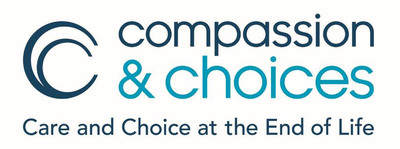Brittany Maynard’s Family, Compassion & Choices Partner With California Lawmakers on End-of-Life Options Bill
Senators Bill Monning, Lois Wolk Craft Legislation to Authorize Aid in Dying for Terminally Ill Adults in Golden State
SACRAMENTO, Calif., Jan. 21, 2015 /PRNewswire-HISPANIC PR WIRE/ — Just a few months after 29-year-old Californian Brittany Maynard had to utilize an Oregon law to end her suffering from terminal brain cancer, two California senators today announced they have authored similar legislation in California. Brittany Maynard’s mother and widower, Compassion & Choices, and a diverse array of supporters praised the introduction of the bill, “The End-of-Life Options Act” (SB 128), at a 1:30 p.m. PT news conference at the state Capitol.

Photo – http://photos.prnewswire.com/prnh/20150121/170547
Photo – http://photos.prnewswire.com/prnh/20150121/170548
Logo – http://photos.prnewswire.com/prnh/20140312/DC81938LOGO-b
“The time is right for California to advance the conversation about end-of-life options,” said Senate Majority Leader Bill Monning, who coauthored the bill with Senator Majority Whip Lois Wolk. “We are working together to establish a process that honors a patient’s right to make informed decisions about dying and respects the individual’s beliefs after receiving a terminal prognosis. We will continue to meet with parties interested in this issue, and are committed to an open and inclusive dialogue as the legislation moves forward.”
Maynard — who suffered debilitating, painful seizures caused by her terminal brain cancer — had to move to Oregon so she could access its death-with-dignity law because California does not authorize this end-of-life option. It gives terminally ill, mentally competent adults the option to request a prescription for aid-in-dying medication that they can choose to take if their suffering becomes unbearable.
California voters support the medical option of aid in dying by more than a 2-1 margin (64% vs. 24%). Yet, two decades after Oregon voters passed the nation’s first death-with-dignity law in 1994, California still has not authorized this end-of-life option.
“Support for this law runs across all demographic categories, from every ethnic, religious and economic background,” said Senate Majority Whip Wolk. “It is not a partisan issue. It is about the most personal freedom there is and guaranteeing terminally ill Californians will have a right to exercise this option if they believe it is right for them.”
In the final weeks of her life, Maynard partnered with Compassion & Choices to launch a campaign on www.TheBrittanyFund.org to make aid in dying an open and accessible medical practice in her home state and throughout the country.
“It is unacceptable that Brittany Maynard had to leave her home, her family, her dogs, her medical team in order to die peacefully, in comfort and in control,” said Rev. Dr. Ignacio Castuera, a board member of Compassion & Choices, which supports the California bill. “The Lord does not want his children to suffer.”
Debbie Ziegler spoke about her mission to keep her only daughter’s legacy alive.
“Brittany fought to the end for expanded availability of end-of-life options in California,” she said. “I will make my daughter, Brittany, proud by standing up and telling her story even if my voice shakes. Even if I choke back tears. I hope that no other Californian has to go through what Brittany did.”
“Having aid in dying as an end-of-life option provided great relief to Brittany,” said Dan Diaz, Brittany’s widower. “It enabled my wife to focus on living her last days to the fullest, rather than having to worry about dying in agony from terminal brain cancer. I promised Brittany I would do everything in my power to fulfill her mission to make this end-of-life option available to all Californians.”
Rapid introduction of the bill mirrors the momentum behind similar legislation around the country.
Since Brittany Maynard’s story broke on Oct. 6, lawmakers have introduced similar bills, or pledged to so, in Washington, D.C. and at least 13 states, including California, Colorado, Florida, Indiana, Maryland, Minnesota, Missouri, New Hampshire, New York, Nevada, Pennsylvania, Wisconsin, and Wyoming. Brittany’s story also is galvanizing Compassion & Choices campaigns to pass bills authorizing aid in dying in Connecticut, Massachusetts, and New Jersey and to defend this legally recognized option in Montana, New Mexico and Vermont.
National and state polls consistently show the vast majority of Americans across the demographic and political spectrum want to maintain their right to choose their medical treatment at the end of their life.
Robert Olvera, M.D., recalled the death of his 25-year-old daughter, Emily Rose, who died last April after four-months of agony caused by a rare form of leukemia.
“As a Catholic and as a father, I never lost hope. But as a physician, I knew what was in store,” said the Santa Ana physician. “My daughter, Emily Rose, was confined to a bed, blind and struggled to breath with excruciating headaches that no medication could alleviate. She suffered horribly as I sat next to her, unable to relieve her pain.”
Jennifer Glass from San Mateo has been living with advanced lung cancer since January 2013.
“We all seek the best quality of life possible, regardless of how much time we have left,” she said. “We expect and demand options across all aspects of life because they influence quality of life. These options must include end-of-life options.”
The California bill is modeled after legislation in Oregon and other states where aid in dying has been proven to be good policy and medical practice.
- It allows only qualified, terminally ill and mentally competent adults to request and obtain a prescription from their physician for medication that the patient can self-administer to bring about a peaceful and humane death. Two physicians must confirm the prognosis is terminal.
- It requires two witnesses to attest that the request is voluntary.
- It protects physicians from civil or criminal liability, and from professional disciplinary action, if they fulfill an eligible individual’s request. Participation by doctors is fully voluntary.
- It provides safeguards against any coercion of patients: It establishes felony penalties for coercing or forging a request; and it honors a patient’s right to rescind the request.
Besides Oregon, aid in dying is authorized in Washington, Montana, Vermont and New Mexico.
About Compassion & Choices
Compassion & Choices is the nation’s oldest and largest nonprofit organization working to improve care and expand choice at the end of life. More information is available at: www.compassionandchoices.org
California Media Contact:
Patricia A. González-Portillo, (323) 819-0310, [email protected]
National Media Contact:
Sean Crowley, (202) 495-8520-c, [email protected]






